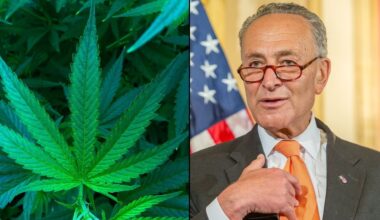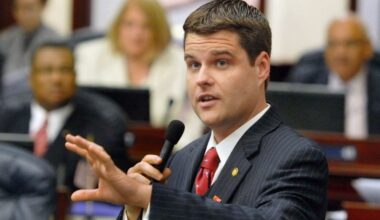The U.S. Supreme Court is being asked to settle an emerging dispute on whether employers can be forced to reimburse workers for the cost of medical cannabis used to treat job-related injuries. To date, state courts have come to differing conclusions on the issue, a situation advocates say warrants intervention from the high court.
In a friend-of-the-court brief filed last week, Empire State NORML and two other groups—the New York City Cannabis Industry Association and the Hudson Valley Cannabis Industry Association—say the justices should take up an appeal out of Minnesota, using it to settle the broader tension on the conflict between state and federal cannabis laws for good.
Going further than the narrow issue of workers’ compensation reimbursements for marijuana, a key piece of the group’s argument is that the federal government has been so inconsistent in its enforcement of cannabis laws that prohibition should be overturned entirely.
“The Court should take this opportunity to prevent the further spread of this insidious condition by invocation of the Doctrine of Estoppel,” the brief says. “It should find that the Schedule I status of cannabis under the federal Controlled Substance Act is no longer enforceable. Doing so will cure the problem.”
The case itself, Musta v. Mendota Heights Dental Center, arises out of a dispute over whether the Controlled Substances Act (CSA) pre-empts a Minnesota state law requiring employers to reimburse workers for the cost of medical marijuana to treat a work-related injury. In October, the Minnesota Supreme Court ruled that the CSA indeed prevented the reimbursement.
That ruling contributed to an emerging split between state courts on the issue. The Maine Supreme Court had decided a case in that state along similar lines, while supreme courts in both New Hampshire and New Jersey have ruled that reimbursements to medical marijuana patients can go forward regardless of federal prohibition.
Susan Musta, the patient in the Minnesota case, filed a brief last month asking the U.S. Supreme Court to take up the case.
“Courts have been bedeviled with difficult questions regarding how to apply state marijuana laws in the shadow of the federal prohibition on marijuana,” her appeal states. “As more and more states legalize and regulate medical and recreational marijuana, cases raising these questions will multiply. This Court’s guidance on this important issue is urgently needed.”
While neither Empire State NORML nor the two industry groups are party to the suit itself, their amicus brief encourages justices to reconsider the state court’s ruling and settle the inconsistency between states.
“The U.S. Supreme Court’s job is to tell when there’s a split between the highest courts in two states or more,” said David C. Holland, a New York attorney and the executive director of Empire State NORML. Holland, who filed the new brief, is also co-founder of the New York City Cannabis Industry Association and the Hudson Valley Cannabis Industry Association.
Generally Holland’s brief argues that although the letter of the CSA is clear—cannabis is a prohibited drug of the most restricted class—permissive actions by the federal government in recent decades have made it virtually impossible for states or medical marijuana patients to know what’s actually allowed.
“Nobody wants to enforce it anymore, but nobody wants to rewrite it,” Holland told Marijuana Moment in an interview. “There’s no longer a good faith basis to let it continue to be enforced.”
States shouldn’t have to settle such a fundamental constitutional questions themselves, his brief says. Failure by the federal government to squarely address the conflict, however, has led to a situation in which most states have passed some form of cannabis legalization despite an almost-categorical ban at the federal level.
“The vast majority of states have found cannabis to be an effective medicine and passed legislation to that effect in direct contravention of the CSA,” the brief says. “It seems fundamentally unfair to place the onus on State Supreme Courts to have to make determinations about the applicability of federal preemption and determine the existence of a ‘positive conflict’ when the U.S. attorney generals [sic] have refused to do [so] for the past 25 years.”
Holland made similar arguments in a separate amicus brief to the Supreme Court last year in a different case.
While federal agencies often claim that the CSA broadly prohibits cannabis activity, Holland’s brief highlights examples of where the government has made sweeping exceptions.
A series of Department of Justice memos under President Barack Obama, for example, advised federal prosecutors not to spend their limited resources to disrupt legal state marijuana programs or target individual patients. Congress has also passed spending restrictions and other measures over the years that effectively allowed state-level legalization of medical cannabis to move forward.
The Trump administration further muddied the waters. Early on, Jeff Sessions, the former president’s first AG and an outspoken critic of cannabis use, rescinded the so-called Cole memo, a Justice Department guidance document advising federal prosecutors not to target state-legal cannabis systems. But Sessions’s successor, Attorney General Bill Barr, promptly pivoted.
“I’m not going to go after companies that have relied on the Cole memorandum,” he said at his confirmation hearings, saying it was “important not to upset the interests and expectations of the businesses and investors who have entered the legal marijuana industry.”
Barr called the situation “untenable,” describing it as “almost like a backdoor nullification of federal law.
U.S. Supreme Court Justice Clarence Thomas also recently took issue with the government’s inconsistent stance on cannabis. In a statement issued in June, after the court declined to take up a tax case centered on cannabis, Thomas criticized the government’s approach as “contradictory” and “unstable.”
“Once comprehensive, the Federal Government’s current approach is a half-in, half-out regime that simultaneously tolerates and forbids local use of marijuana,” he wrote.
“Whatever the merits of Raich when it was first decided, federal policies of the past 16 years have greatly undermined its reasoning,” Thomas continued, referring to a 2005 Supreme Court ruling, Gonzales v. Raich, where the court ruled the federal government could prohibit state-level cannabis activity irrespective of state law. “Though federal law still flatly forbids the intrastate possession, cultivation, or distribution of marijuana … the Government, post-Raich, has sent mixed signals on its views.”
Thomas wrote that the situation “strains basic principles of federalism and conceals traps for the unwary.”
“Given all these developments,” he said, “one can certainly understand why an ordinary person might think that the Federal Government has retreated from its once-absolute ban on marijuana.
In light of the federal government’s ambiguous approach, Holland’s brief contends that the cannabis’s Schedule I designation under the CSA should be done away with completely as a matter of fundamental fairness.
“The festering supremacy and nullification legal carbuncle continues to infect American jurisprudence with regard to the Schedule I designation of cannabis,” the brief concludes. “It must be eradicated to end this constitutional crisis. The need for supremacy of all rational federal laws, Due Process, and notions of fairness all should compel this Court to invoke the Doctrine of Estoppel to cure this problem once and for all.”
Mendota Heights Dental Center is due to file its response to Musta’s request for the Supreme Court to take up the case on January 14. After that time, the justices will decide whether to hear the appeal.
IRS Official Gives Marijuana Businesses Advice On Tax Compliance
Photo elements courtesy of rawpixel and Philip Steffan.
Medical Disclaimer:
The information provided in these blog posts is intended for general informational and educational purposes only. It is not a substitute for professional medical advice, diagnosis, or treatment. Always seek the advice of your physician or other qualified healthcare provider with any questions you may have regarding a medical condition. The use of any information provided in these blog posts is solely at your own risk. The authors and the website do not recommend or endorse any specific products, treatments, or procedures mentioned. Reliance on any information in these blog posts is solely at your own discretion.







